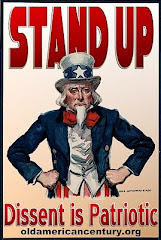"War on terror" ends
 Today marks a week since President Obama first walked into the Oval Office, sat down at the Big Desk and got to work.
Today marks a week since President Obama first walked into the Oval Office, sat down at the Big Desk and got to work.
The man’s no slouch. He’s made instant changes to a lot of things that needed changing in order to make America a democracy again, ruled by the People, the Constitution, and the law. Obama is working hard to rebuild America’s credibility at home and all over the world. If he keeps on like this, he’s going to succeed.
And on Monday, with little fanfare, President Obama put an end to Bush’s catastrophic – in all senses of the word – “war on terror.”
I didn’t parse this by myself. I listened to Obama’s interview on the al-Arabiya news network online on Monday. I thought his responses to the interviewer’s questions were calm, sane and thoughtful. As it was his first one-on-one television interview since becoming president, I thought it both interesting and strategically clever for him to have given it on Arab television.
But it took the observant and wise Roger Cohen, who writes the blog Passages for the International Herald Tribune, to point out to me what Obama really did on Monday: end the "war on terror."
I read Cohen’s post, “After the War on Terror” this morning. It stopped me dead in my tracks.
Because nothing has changed, really. There are still terrorists in the world. The conditions – societal, cultural, political – that give rise to terrorism, still exist, and as long as the tactic works, terrorists will still kill innocent people to make their point. Terrorism isn’t new in the world; indeed, it’s one of the oldest tactics on Earth for manipulating governments and their people, and it’s been used since time out of mind by disenfranchised individuals and groups, and governments themselves, to do just that.
No, what’s different now is that finally, after eight horrendous years of treating terrorism as if it’s a foreign army, fightable with air strikes and phosphor bombs and the occupation of foreign countries by American soldiers, Obama has given America a shake and said, forcefully, “Think!”
Before the idiot George W. Bush and his enablers came along, America knew how to fight terrorism. We weren’t always real good at it, but we knew the basics, and one of the first rules is "Don't fight terrorism with terror." Instead, you fight terrorism first with prevention, then with intelligence and finally with solid, boring police work. It’s not glamorous, but it’s effective. Once caught, the terrorist faces the laws the land and stands trial, like any other criminal. The punishment, if he’s found guilty, fits the crime and is not excessive. And if the country doing the prosecuting is moral and fair, then the issues which motivated the terrorist to commit his crime will be studied and, if they’re credible, steps will be taken to resolve them.
That’s the moral way to fight terrorism. It’s the right way. The only way, really. But the most important step is that first one – preventing terrorism in the first place. Doing so is difficult. Governments are notorious for disenfranchising populations – we only have to look to the decades-old, ongoing tragedy involving the Israelis, the Palestinians and the Gaza Strip to find a perfect example. Another is Northern Ireland. As the years pass the injuries grow and become more complex, more ingrained on both sides. Grudges deepen and hurts are not forgiven or forgotten. As the crimes committed by both sides go unpunished – or overpunished – and unresolved, things only get worse and worse, until it seems impossible that any solution can be found. The disenfranchised groups, which are weak and have few means, fall back on what they see as their only option – terrorism and guerrilla war, which are cheap and occasionally effective. Governments respond by becoming terrorists themselves, raining death and destruction down on innocent civilians. And the vicious cycle continues, sometimes for generations.
That’s why prevention – avoiding situations that lead to the disenfranchisement of certain populations and, if it’s already happened, then working diligently to find a solution that is acceptable to all sides – is so important. Once the terrorism monster escapes its bonds, it’s very, very hard to stop.
But that’s what President Obama did when he sat down to that interview with al-Aribiya on Monday. He took the first, most important step in fighting terrorism: He offered respect to the Muslim world, showed he understood the issues involved, and spelled out America’s new, rational willingness to work with them for peace. He put the responsibility for an end to terrorism on the shoulders of all sides, equally.
That was clever. It was moral. And it’s like a deep breath of fresh, clean air after eight long years of breathing the Bush administration's hot, noxious swamp gas.











3 comments:
"That was clever. It was moral." Those and many other things, like patriotic, smart, and gutsy. Having worked with the military most of my life, I know very well the limits of its power. The most powerful means of facing the challenges to any nation has always been sincere dialog.
Let's hope the Republicans are also willing to listen to Obama's moral message ... in sad truth they may never comprehend the notion of cooperation and harmony.
I wish you were right, but Obama - within 3 days of taking office- proved that he would continue the status quo.
He ordered more air strikes in Pakistan by unmanned drones, killing 14 civilians (but 8 militants!).
He can use the language he wants, and try to convert everyone with his rhetoric...but for those people that are directly affected by our "war on terror," actions speak louder than words.
Post a Comment